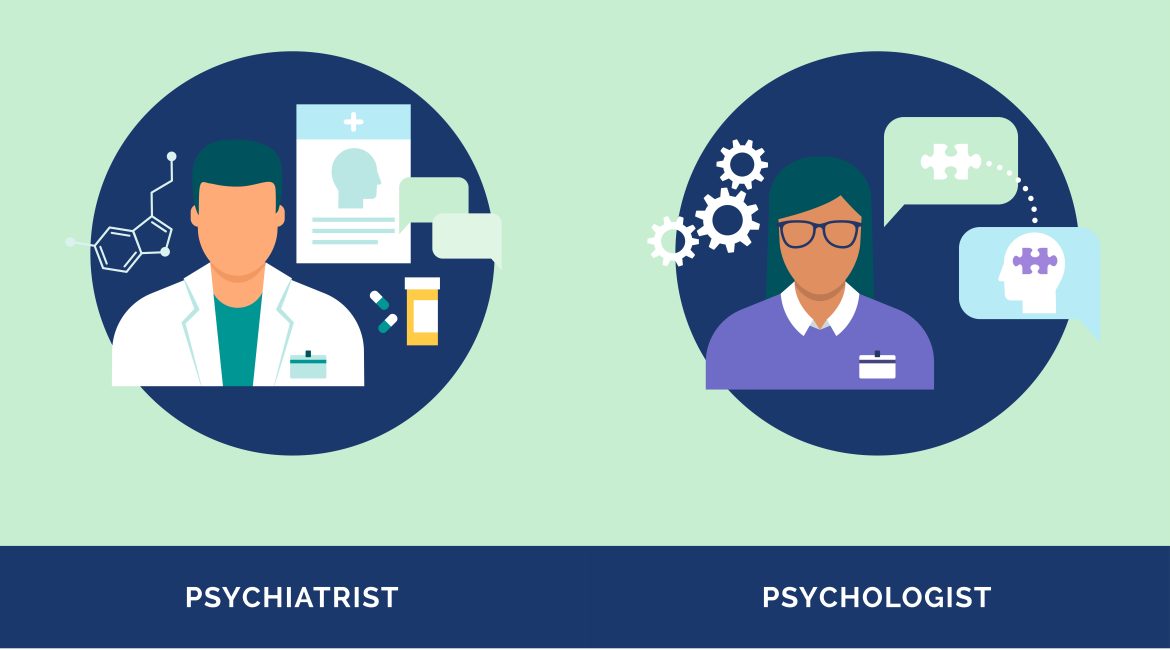When it comes to mental health care, understanding the difference between a psychiatrist and a psychologist can help you determine which professional is best suited to address your needs. While both psychiatrists and psychologists are trained to help with mental health issues, their approaches, training, and services differ significantly.
Psychiatrists
Training and Approach: Psychiatrists are medical doctors (MDs or DOs) who specialize in diagnosing, treating, and preventing mental health disorders. Their medical training allows them to prescribe medications, making them well-suited for managing conditions that require pharmacological intervention.
Conditions Treated:
Schizophrenia: Psychiatrists can prescribe antipsychotic medications and provide ongoing management.
Depression: They often prescribe antidepressants and may recommend therapy in conjunction with medication.
Multiple Sclerosis: While primarily a neurological condition, psychiatrists can help manage associated mental health issues like depression and anxiety.
Anxiety: Medication management for severe anxiety disorders is common.
Sleep Disorders: They can prescribe medications and suggest lifestyle changes to improve sleep.
Bipolar Disorders Treatment: Medication is crucial for stabilizing mood swings in bipolar disorder.
When to See a Psychiatrist: If you have severe symptoms or a complex mental health condition that might require medication, seeing a psychiatrist is advisable. For issues like schizophrenia, bipolar disorder, or severe depression and anxiety, the best psychiatrist consultation can provide comprehensive care.
Psychologists
Training and Approach: Psychologists typically hold a doctoral degree in psychology (Ph.D. or Psy.D.). They focus on psychotherapy (talk therapy) and behavioral interventions. They are not medical doctors and usually cannot prescribe medication (though this can vary by region).
Therapies Offered:
Psychometric Assessments: Our team conducts thorough evaluations to assess cognitive abilities, encompassing IQ, behavioral patterns, and developmental milestones. These assessments are indispensable for diagnosing conditions such as ADHD, autism, and learning disabilities. For autism assessments, we employ the ADOS (Autism Diagnostic Observation Schedule) to ensure precise and accurate diagnosis.
Therapy: Psychologists provide various forms of therapy, including cognitive-behavioral therapy (CBT), which is effective for anxiety and depression.
Family Therapy and Couple Therapy: They help families and couples navigate relational issues.
Treatment for Multiple Sclerosis: Psychologists can assist with coping strategies and emotional support.
Bipolar Disorders Treatment: Therapy complements medication to help manage the condition.
Sleep Disorders: Behavioral techniques can be used to improve sleep hygiene.
When to See a Psychologist: If you’re looking for therapy to help with emotional, psychological, or behavioral issues, a psychologist is a great choice. They can assist with managing depression, anxiety, relationship problems, and coping strategies for chronic conditions.
Choosing the Right Professional
The decision to see a psychiatrist or psychologist depends on the nature and severity of your condition. For issues that are likely to benefit from medication, such as schizophrenia, bipolar disorder, and severe depression or anxiety, a psychiatrist would be the appropriate choice. On the other hand, if you need therapy for coping strategies, relationship issues, or emotional support, a psychologist can provide the necessary care.
At our mental health clinic, we offer comprehensive services to address a wide range of mental health needs. Our team includes both psychiatrists and psychologists, ensuring that you receive the best possible care tailored to your unique situation. Whether you need therapy, medication management, or both, we are here to support you on your journey to better mental health.
Understanding these differences can help you make an informed decision about your mental health care and ensure you get the most appropriate treatment for your needs.
We accept a wide range of insurance plans, ensuring best mental and neurological healthcare is accessible to you. Whether you need assistance managing a psychiatric condition or require neurological treatment, we are here for you. Contact us today to verify your insurance coverage and learn more about our comprehensive services.



